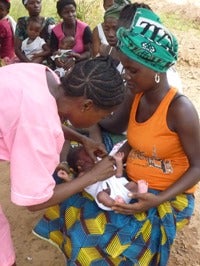
As an American who grew up in a culture where fiercely and loudly complaining is the sine qua non of changing the system, I was surprised by this woman’s comment. And yet it held important insights for those of us working to promote social accountability (the engagement of citizens in fostering accountability). In particular, her comment illustrated the importance of understanding socio-cultural dynamics when working to strengthen accountability mechanisms in communities.
In Sierra Leone, where the government offers free health services to expecting and new mothers and children under five to reduce the country’s alarming mortality rates, challenges nevertheless remain. Civil society organizations have pointed to gaps in monitoring that leave clinics with absent nurses, insufficient drugs, and incorrectly imposed fees for free services. Part of the government and civil society’s solution has been to invest heavily in social accountability and engage citizens in monitoring service delivery and reporting gaps.
During my past year providing support to social accountability interventions in Sierra Leone’s health sector, I have seen how accountability efforts influence, and in turn are shaped by, the complex relationship between citizens and local state agents. Social accountability has sometimes encouraged a seemingly adversarial relationship between the “supply” and the “demand” sides of service delivery, modeled on a view of delivery as consisting of detached economic transactions that can be optimized by improving transparency and accountability. Citizens are often pitted against state agents to demand their rights and monitor service provider actions.
 Yet this construct does not fit with the intensely local nature of much of government’s work, particularly in the health sector. A maternal child health clinic–the most basic primary health unit in Sierra Leone–may employ a single nurse to serve 15 surrounding villages with over 3500 residents. The nurse confronts a range of constraints to care, not the least of which are limited resources; this can make her 24-hour on-call job seem like a Herculean effort. If community members complain about the nurse, they risk alienating her and creating a further barrier to desperately needed care. Indeed, citizens may face high costs if their demand for improved service delivery offends the sole person equipped to provide such care.
Yet this construct does not fit with the intensely local nature of much of government’s work, particularly in the health sector. A maternal child health clinic–the most basic primary health unit in Sierra Leone–may employ a single nurse to serve 15 surrounding villages with over 3500 residents. The nurse confronts a range of constraints to care, not the least of which are limited resources; this can make her 24-hour on-call job seem like a Herculean effort. If community members complain about the nurse, they risk alienating her and creating a further barrier to desperately needed care. Indeed, citizens may face high costs if their demand for improved service delivery offends the sole person equipped to provide such care.
Facilitators prepared to conduct community workshops like the one in Tonkolili district are well aware of this risk. As one woman role-played the part of the nurse, she warned community members in the Krio language, “if u feel say a geh bad way, u wait mek u cam meet me nex tem” (“if you are complaining that I have a bad attitude now, just wait until the next time you visit”). Local community paralegal organizations, who have started taking up citizen grievances in the health sector, have reported similar challenges. For example, citizens who paid for free health care services have resisted filing formal complaints with administrative bodies for fear of alienating the health providers they may need to call upon for emergency care in the coming days, weeks, or months. With dramatic supply-side constraints, citizens often reason that their best option is to work together with clinic staff–outside formal reporting channels–to resolve issues.
Against this backdrop, how can we design effective social accountability programs to enhance service delivery? In four districts of Sierra Leone, the government of Sierra Leone, with World Bank support, is piloting an approach where community members partner with clinic staff to form a “social contract” to improve health. Guided by facilitators like those in Tonkolili, community members and clinic staff make mutual commitments to improve service delivery and health outcomes. In response to the issue of nurse absenteeism, the nurse might commit to keeping the clinic open during regular hours and notifying community members in advance if she must be away; meanwhile the community might commit to supporting the nurse by helping her collect water for the clinic and maintaining a vegetable garden for her use. Facilitators invest in understanding the specific problems (behavioral, relational, resource-related, or otherwise) undermining health care delivery in a particular community. They then help broker promises that both parties can keep in an effort to strengthen the relationships and accountability structures in the community. Through this approach, reporting through administrative channels or other formal legal action become tools of next resort for serious rights-infringements or when community-centered solutions fail.
The government is evaluating the results of the pilot through a randomized controlled trial, and the Justice for the Poor (J4P) program is conducting supplemental qualitative research to help understand the dynamics of change. The hope is to better understand how to effectively and sustainably improve health service delivery and strengthen the citizen-state relationship.


Join the Conversation